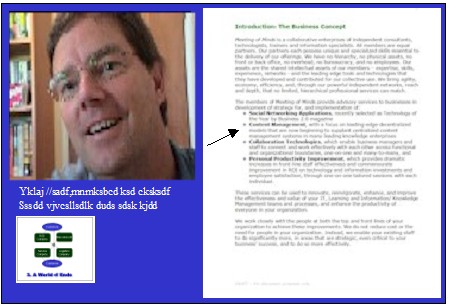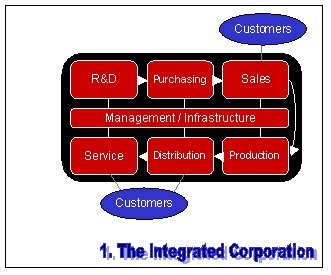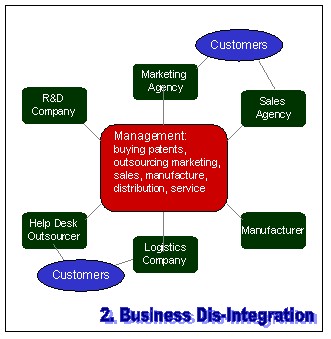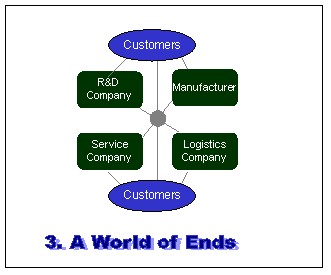| This article is adapted from a presentation I am making at the World Congress on Intellectual Capital & Innovation at McMaster University later this week.
 I‘m going to start this future state vision at the front lines of a typical corporation, and look over the shoulder of a typical knowledge worker in 2015. The company this employee works for no longer has a knowledge centre, in-house researchers or a corporate library. In fact, it has outsourced and shrunk its IT and other infrastructure to zero. It has no in-house overhead, no ‘back office’. Everyone on the payroll either sells product or delivers services to customers. The company learned a valuable lesson in the early 2000s, when it released two commercial software tools to all its staff: instant messaging software, and VoIP global peer-to-peer telephony. These two products, which cost the firm absolutely nothing, quickly became the highest-rated and most-used IT applications in the company, even though staff had received no training in their use. Since that time, the primary technology strategy and KM strategy of the company has, as a result, been to propagate simple, free tools to all staff, and develop no technologies internally. The entire financial system of the global corporation is run by three people, and aside from the company’s public e-commerce site there are no centralized repositories or centrally-managed websites. Each employee’s laptop now contains the following tools and content:
With this powerful, simple suite of tools, knowledge management has become a personal rather than a corporate matter. The company no longer needs centralized infrastructure or content management, or full-time information professionals. KM & IT really have become ëeveryone’s jobí, and corporations no longer need website development specialists, website managers, content architects, content managers, network coordinators, or database purchasers. Front-line professionals do their own analysis and much of their own research as well. The personal laptop, with its context-rich content selectively and simply made available to others inside and outside the company, has become each individual employee’s and independent contractor’s proxy, resume, and calling card. And the ëvirtual presenceí and other tools empower each worker to conduct business effectively, collaborate with colleagues and attend meetings anywhere in the world without incurring the time or cost of travel. Let’s step back now from the perspective of the knowledge worker and look at how the business environment for corporations has changed in 2015. In the early 2000s, large corporations that were once hierarchical end-to-end business enterprises began shedding everything that was not deemed ëcore competencyí, in some cases to the point where the only things left were business acumen, market knowledge, experience, decision-making ability, brand name, and aggregation skills. This ‘hollowing out’ allowed multinationals to achieve enormous leverage and margin. It also made them enormously vulnerable and potentially dispensable.
As a result of these changes, the economy of 2015 is vastly different in some key ways from the economy of 2004:
What are the implications of this to those of us in, or looking for, careers in tomorrow’s business?
It’s always fun to predict the future, and I hope you’ve found my prognostications interesting. I’d like to thank my weblog readers for helping me qualify these ideas and make this presentation more informative and credible than it might otherwise have been. [Conclusion & Questions]. |
Navigation
Collapsniks
Albert Bates (US)
Andrew Nikiforuk (CA)
Brutus (US)
Carolyn Baker (US)*
Catherine Ingram (US)
Chris Hedges (US)
Dahr Jamail (US)
Dean Spillane-Walker (US)*
Derrick Jensen (US)
Dougald & Paul (IE/SE)*
Erik Michaels (US)
Gail Tverberg (US)
Guy McPherson (US)
Honest Sorcerer
Janaia & Robin (US)*
Jem Bendell (UK)
Mari Werner
Michael Dowd (US)*
Nate Hagens (US)
Paul Heft (US)*
Post Carbon Inst. (US)
Resilience (US)
Richard Heinberg (US)
Robert Jensen (US)
Roy Scranton (US)
Sam Mitchell (US)
Tim Morgan (UK)
Tim Watkins (UK)
Umair Haque (UK)
William Rees (CA)
XrayMike (AU)
Radical Non-Duality
Tony Parsons
Jim Newman
Tim Cliss
Andreas Müller
Kenneth Madden
Emerson Lim
Nancy Neithercut
Rosemarijn Roes
Frank McCaughey
Clare Cherikoff
Ere Parek, Izzy Cloke, Zabi AmaniEssential Reading
Archive by Category
My Bio, Contact Info, Signature Posts
About the Author (2023)
My Circles
E-mail me
--- My Best 200 Posts, 2003-22 by category, from newest to oldest ---
Collapse Watch:
Hope — On the Balance of Probabilities
The Caste War for the Dregs
Recuperation, Accommodation, Resilience
How Do We Teach the Critical Skills
Collapse Not Apocalypse
Effective Activism
'Making Sense of the World' Reading List
Notes From the Rising Dark
What is Exponential Decay
Collapse: Slowly Then Suddenly
Slouching Towards Bethlehem
Making Sense of Who We Are
What Would Net-Zero Emissions Look Like?
Post Collapse with Michael Dowd (video)
Why Economic Collapse Will Precede Climate Collapse
Being Adaptable: A Reminder List
A Culture of Fear
What Will It Take?
A Future Without Us
Dean Walker Interview (video)
The Mushroom at the End of the World
What Would It Take To Live Sustainably?
The New Political Map (Poster)
Beyond Belief
Complexity and Collapse
Requiem for a Species
Civilization Disease
What a Desolated Earth Looks Like
If We Had a Better Story...
Giving Up on Environmentalism
The Hard Part is Finding People Who Care
Going Vegan
The Dark & Gathering Sameness of the World
The End of Philosophy
A Short History of Progress
The Boiling Frog
Our Culture / Ourselves:
A CoVid-19 Recap
What It Means to be Human
A Culture Built on Wrong Models
Understanding Conservatives
Our Unique Capacity for Hatred
Not Meant to Govern Each Other
The Humanist Trap
Credulous
Amazing What People Get Used To
My Reluctant Misanthropy
The Dawn of Everything
Species Shame
Why Misinformation Doesn't Work
The Lab-Leak Hypothesis
The Right to Die
CoVid-19: Go for Zero
Pollard's Laws
On Caste
The Process of Self-Organization
The Tragic Spread of Misinformation
A Better Way to Work
The Needs of the Moment
Ask Yourself This
What to Believe Now?
Rogue Primate
Conversation & Silence
The Language of Our Eyes
True Story
May I Ask a Question?
Cultural Acedia: When We Can No Longer Care
Useless Advice
Several Short Sentences About Learning
Why I Don't Want to Hear Your Story
A Harvest of Myths
The Qualities of a Great Story
The Trouble With Stories
A Model of Identity & Community
Not Ready to Do What's Needed
A Culture of Dependence
So What's Next
Ten Things to Do When You're Feeling Hopeless
No Use to the World Broken
Living in Another World
Does Language Restrict What We Can Think?
The Value of Conversation Manifesto Nobody Knows Anything
If I Only Had 37 Days
The Only Life We Know
A Long Way Down
No Noble Savages
Figments of Reality
Too Far Ahead
Learning From Nature
The Rogue Animal
How the World Really Works:
Making Sense of Scents
An Age of Wonder
The Truth About Ukraine
Navigating Complexity
The Supply Chain Problem
The Promise of Dialogue
Too Dumb to Take Care of Ourselves
Extinction Capitalism
Homeless
Republicans Slide Into Fascism
All the Things I Was Wrong About
Several Short Sentences About Sharks
How Change Happens
What's the Best Possible Outcome?
The Perpetual Growth Machine
We Make Zero
How Long We've Been Around (graphic)
If You Wanted to Sabotage the Elections
Collective Intelligence & Complexity
Ten Things I Wish I'd Learned Earlier
The Problem With Systems
Against Hope (Video)
The Admission of Necessary Ignorance
Several Short Sentences About Jellyfish
Loren Eiseley, in Verse
A Synopsis of 'Finding the Sweet Spot'
Learning from Indigenous Cultures
The Gift Economy
The Job of the Media
The Wal-Mart Dilemma
The Illusion of the Separate Self, and Free Will:
No Free Will, No Freedom
The Other Side of 'No Me'
This Body Takes Me For a Walk
The Only One Who Really Knew Me
No Free Will — Fightin' Words
The Paradox of the Self
A Radical Non-Duality FAQ
What We Think We Know
Bark Bark Bark Bark Bark Bark Bark
Healing From Ourselves
The Entanglement Hypothesis
Nothing Needs to Happen
Nothing to Say About This
What I Wanted to Believe
A Continuous Reassemblage of Meaning
No Choice But to Misbehave
What's Apparently Happening
A Different Kind of Animal
Happy Now?
This Creature
Did Early Humans Have Selves?
Nothing On Offer Here
Even Simpler and More Hopeless Than That
Glimpses
How Our Bodies Sense the World
Fragments
What Happens in Vagus
We Have No Choice
Never Comfortable in the Skin of Self
Letting Go of the Story of Me
All There Is, Is This
A Theory of No Mind
Creative Works:
Mindful Wanderings (Reflections) (Archive)
A Prayer to No One
Frogs' Hollow (Short Story)
We Do What We Do (Poem)
Negative Assertions (Poem)
Reminder (Short Story)
A Canadian Sorry (Satire)
Under No Illusions (Short Story)
The Ever-Stranger (Poem)
The Fortune Teller (Short Story)
Non-Duality Dude (Play)
Your Self: An Owner's Manual (Satire)
All the Things I Thought I Knew (Short Story)
On the Shoulders of Giants (Short Story)
Improv (Poem)
Calling the Cage Freedom (Short Story)
Rune (Poem)
Only This (Poem)
The Other Extinction (Short Story)
Invisible (Poem)
Disruption (Short Story)
A Thought-Less Experiment (Poem)
Speaking Grosbeak (Short Story)
The Only Way There (Short Story)
The Wild Man (Short Story)
Flywheel (Short Story)
The Opposite of Presence (Satire)
How to Make Love Last (Poem)
The Horses' Bodies (Poem)
Enough (Lament)
Distracted (Short Story)
Worse, Still (Poem)
Conjurer (Satire)
A Conversation (Short Story)
Farewell to Albion (Poem)
My Other Sites








David, thanks for this excellent periscoping into the future. I personally find your analysis accurate and true to the overall macro and micro happenings unaccounted for by the “propaganda-based” mainstream media.I find your key outline of future implications to be right on target and to fully represent the vision that I work toward in my daily efforts.I personally doubt that the time needed to get there is 11 years and I also hold personal opinions that major revolutionary changes to our planet/society as we know it may take place before then. (I would have probably avoided myself making this evident as it would have made much less effective the sharing and spreading of your basic fundamental ideas).I must truly thank you for this wonderful hard work of yours and for the pure pleasure I receive in seeing how dedicate and passionate your mission of sharing your intellectual explorations is.Robin
Great stuff, Dave – and I would like to sincerely and solidly second Robin’s thanks and pleasure.
Does this mean we’ll have to wait until 2015 to get that “super address book” you mentioned?
Paul: Only if you wait for Microsoft to develop it ;-) Seriously, it’s an important need that’s getting a lot of traction in business circles, and wouldn’t be hard to develop, so I’d bet you’ll see it within a couple of years. We’re all sick of the lack of compatibility and interoperability of the existing commercial address books.
A very interesting article, I believe it is not very far fetched as one may think. The only point I am sceptical of is the suggested inability by the dominant players to stop/slow-down the movement towards entrepreneurial networks.
goog news !!! A very interesting article.
I found your views most interesting to read, that